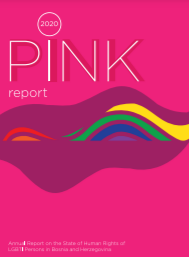Pink Report 2020. Annual Report on the State of Human Rights of LGBTI Persons in Bosnia and Herzegovina
Pink Report 2020. Annual Report on the State of Human Rights of LGBTI Persons in Bosnia and Herzegovina
Author(s): Darko Pandurević, Delila Hasanbegović, Jozo Blažević, Nejra AgićContributor(s): Emina Bošnjak (Editor), Vladana Vasić (Editor), Tarik Vukas (Translator)
Subject(s): Gender Studies, Media studies, Civil Law, Human Rights and Humanitarian Law, Evaluation research, Social differentiation, Family and social welfare, Social Norms / Social Control
Published by: Sarajevo Open Centre
Keywords: BiH; LGTBI; human rights; judiciary; hate crime; same-sex partnerships; legislation; equality; freedom of assembly; family life; transgender; intersex; asylum; media;
Summary/Abstract: During the last year, two key events for LGBTIQ persons took place in Bosnia and Herzegovina: the first Bosnian-Herzegovinian pride march (B&H Pride March) was held, and Sarajevo Canton (SC) adopted an LGBTI (lesbian, gay, bisexual, transgender and intersex persons) inclusive Gender Action Plan (GAP). Although the B&H Pride March was the last to be held in the Western Balkans region, it was the most successful Pride in terms of the number of people marching, as well as in the context of security – not a single security incident occurred. In addition to being a significant event for the lesbian, gay, bisexual, transgender, intersex and queer (LGBTIQ) persons, it gave hope to many B&H citizens that Bosnia and Herzegovina (B&H) can fulfill its potential as a tolerant and diverse country. Out of the 18 measures related to women’s and LGBTI rights proposed by Sarajevo Open Centre (SOC), 14 of them are included in GAP of SC, including measures concerning prevention and protection against gender-based and domestic violence, and for LGBTI persons, as particularly marginalized groups, introduction of special cooperation procedures between the police and the prosecutor’s office in processing of hate crimes, alongside with measures that include trans inclusive standards and protection in the areas of sexual and reproductive health and integrity. At the beginning of 2020, an inter-ministerial working group was finally formed to analyze the existing regulations and propose new ones that need to be adopted, in order for couples in same-sex unions to exercise the rights arising from the European Convention for the Protection of Human Rights and Freedoms. However, all this progress has been accompanied by strong opposition and obstruction. After the Pride was announced, hate speech against LGBTIQ persons intensified, and Cantonal MP Samra Hajdarević Ćosović called for the segregation of LGBTIQ persons. Several attacks on LGBTIQ persons had taken place in the public sphere, and none was prosecuted as a hate crime, while only one was prosecuted overall, qualified as a misdemeanor, and the perpetrator was fined. An immense and disproportionate financial burden was placed on the backs of the organizers of the first Pride March, as one of the conditions for holding the Pride. Without the determination and ability, and the backing of partners and supporters, the Pride March would not have been possible. This development shows there is a bit more freedom and support for LGBTI persons in Bosnia and Herzegovina, but that additional strong efforts are needed to make significant progress towards the equality and acceptance of LGBTIQ persons, particularly in the areas of legal gender recognition, legal regulation of freedom of assembly, and hate speech, as well as processing of incitement to violence and of violence against LGBTIQ persons. Legal recognition of same-sex unions, and also Action Plan for equality of LGBTI persons, are in the early stages of development and, in order for them to really have an impact on everyday lives of LGBTIQ persons, we need to see a clear institutional and political will to adopt and implement them. In addition to the local LGBTI community, support for the vulnerable LGBTI migrants and asylum seekers in Bosnia and Herzegovina will require much more effort in the years to come. The support of the media, institutions and partners will also be needed, as history has repeatedly shown that minorities become more vulnerable in times of crisis. The new socio-economic reality and undemocratic trends will have a negative impact on the well-being, security and human rights of LGBTI persons in B&H during the next few years.
Journal: ROZI IZVJEŠTAJ
- Issue Year: 2020
- Issue No: *
- Page Range: 9-73
- Page Count: 65
- Language: English

